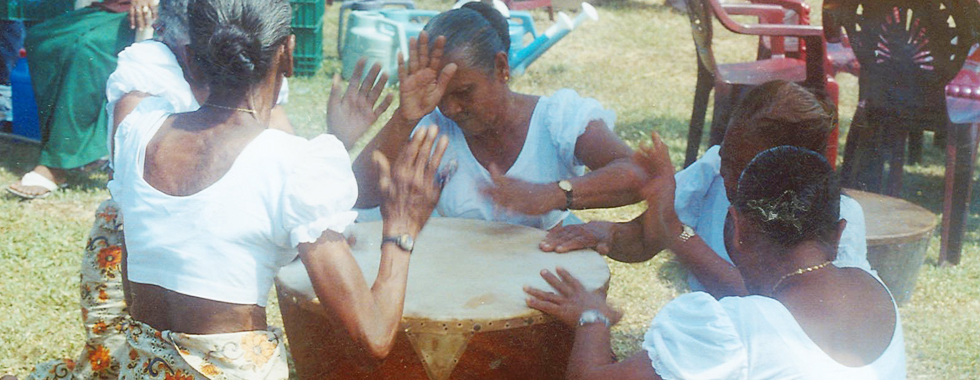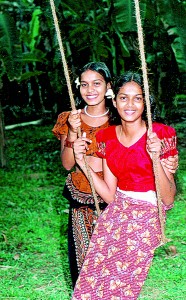Once it was simple rural fun
The Aluth Avurudda which dawns tomorrow, opens a window to the past, a past when the Avurudda lifted the spirit of our rural folk and stimulated their creativity. The result is the wealth of folk games, songs, verse and practices that have come down to us making the Aluth Avurudda an enriching cultural experience.

Simple pleasure: Raban playing and the onchilla
Lankans were a farming community from early history. The origin of the Aluth Avurudda is traced to the harvest festival of a highly organised agrarian society when people’s lives revolved around Mother Nature with the movement of the sun playing a dominant role. And the Avurudda, happily coincided with the Maha harvest with the freshly harvested rice crop being brought home in time for the celebrations.
Bak, the Avurudu month being spring time in the island added to the mood of the people. The trees bore fruit, flowers bloomed and the air was fresh and crisp. Besides, a spirit of light-heartedness pervaded across the community with everybody being free of work.
The Aluth Avurudda against such a scenario, turned out to be an authentic folk celebration and folk games, songs and other joyful practices associated with the Avurudda could be seen as spontaneous outbursts of such a farming community. Once the feasting was over, people were out in the open, indulging in fun and frolic. “Onchilla padeema” in a rope swing, suspended from a branch of a tree in the village, was a favourite pastime of village damsels during the Avuruddha. This naturally made way for “Vaarang kavi” or “onchili kavi,” sung, keeping to the swinging rhythm of the “onchillawa.”
Raban playing during the Aluth Avurudda, brought utmost joy to the womenfolk, when clad in cheerful cheettha redda and jacket, they let themselves go on the rabana. A group of about six women sat around a large rabana and beat it rhythmically with the palms to the tune of numerous raban pada which have been composed over the years by the fun-loving. Often there were humorous moments during raban playing when rival groups played beating to tunes of impromptu verses composed to make fun out of a person or a situation. The specialists showed off their skills, clapping hands with the other players in between the playing of the rabana. Or, they rose and did a few dance steps before returning to the rabana without interfering with the tune. Elbows were also used alternately to beat the rabana and so were ekels tied into a small bundle.
 It was not only for fun that raban was played in the olden days. But it was also played to mark each auspicious hour, long before crackers took over this function. A catchy raban pada, yet a favourite is: “Udin udin wara petthappu, Yatin yatin wara petthappu,Udin udin wara, yatin, yatin wara, Kevun kanta wara petthappu – an endearing call to the pet parrot to come from above or from ground and consume the avurudu sweetmeat-kavun. A plucky raban player’s boast however was: “Buwul, buwul bandakka,Thuttu dekata mang gattha, Thutti dekata mang aragena, Thuttu thunata mang wikka” (I bou-ght ladies’ fingers for 2 cents, I bought for 2 cents and sold for three cents)
It was not only for fun that raban was played in the olden days. But it was also played to mark each auspicious hour, long before crackers took over this function. A catchy raban pada, yet a favourite is: “Udin udin wara petthappu, Yatin yatin wara petthappu,Udin udin wara, yatin, yatin wara, Kevun kanta wara petthappu – an endearing call to the pet parrot to come from above or from ground and consume the avurudu sweetmeat-kavun. A plucky raban player’s boast however was: “Buwul, buwul bandakka,Thuttu dekata mang gattha, Thutti dekata mang aragena, Thuttu thunata mang wikka” (I bou-ght ladies’ fingers for 2 cents, I bought for 2 cents and sold for three cents)
Simple thoughts of the rural folk which they turned into rhythmic tunes infused with humour. Games such as “olinda keliya,” “pancha dameema” and “daan dameema” (draughts) were essentially indoor games. Group games which were keenly contested were part of the excitement of the Aluth Avuruddu Ulela held in the village and served as the climax of the avurudu celebrations. Some of these were hot favourites and especially delightful to watch was the game “scraping of coconuts” when a group of women, sitting on their scrapers, scraped away the coconut to be the first to finish. Even in the “weaving of coconut fronds” the quickest with the nimble fingers won the game.
The game that made the loudest noise was “kamba adeema” or “tug of war” when, mostly the stronger villagers, divided into two teams, used their strength to pull the rope to their side. The most challenging however was the climbing of the greased pole.The entire village turned out to participate or watch the games and the games that enthralled spectators most were the marking of the eye of the elephant and the breaking of the hanging clay pot with a stick which the contestant had to do blindfolded.
The pillow fight or the “kotta pore” may have been the macho game at the Avurudu Ulela. Two contestants had to fight with the pillow, keeping one hand behind and seated balancing on a pole fixed high. The contestant who falls is out of the game and the next takes his turn.
The earliest venue for these folk “Avurudu Keli” had been the paddy field which had served as the playground with the Maha crop being harvested. Later, with the growth of events, the venue may have got bigger and items expanded with kathuru onchilla, bambara onchilla even thirikkala and elephant races being included in the Avurudhu Sanakeliya. However, the selection of the Avurudu Kumari, the most winsome lass of all, has a long history and continues to remain as the grand finale of the Avurudu celebrations.
We get a glimpse of these folk games today at mega Avurudu celebrations which unlike the Avurudu Ulelas of the past, are sponsored events of commercial or other establishments. What we find interesting however, is the impact the Aluth Avurudda makes today on commercials and how it has fired the imagination of the business-world as seen in the print and the electronic media. “XXXL Avurudhu offer” comes from a fashion house while “Super Happy Avurudu Vaasi” is the batting-line of a supermarket chain whereas, the offer of another mega chain is combined with good fortune – “A chance to choose, A chance to win.”
The call from a music-centre however is in keeping with its subject. Its sale is to celebrate the Avurudu in “harmony.”Food is a vital component of the festivities and a food-line is “spicing up the festive season” in order to enable customers to “enjoy a safe and wholesome Avurudda.”
The assurance for a highlife comes for you for the “Soorya Mangallaya” with discounted air conditioners – a message which might be well-received in the April heat.
The ornamental kokis – the crisp Avurudu favourite, seems to be going places this year as we find it has been used in the title name of a mega shop to give the Avurudu flavour. Its scope seems to be limitless as it has even been used as the design not only on sarees but even on ties!


